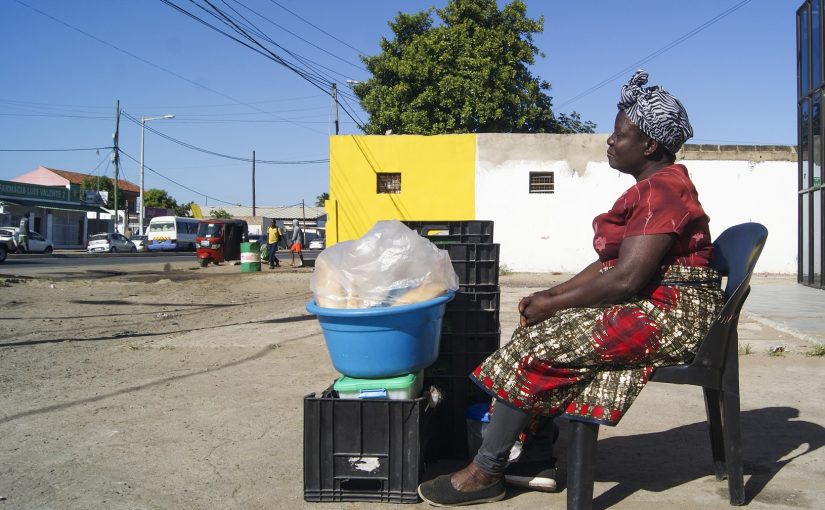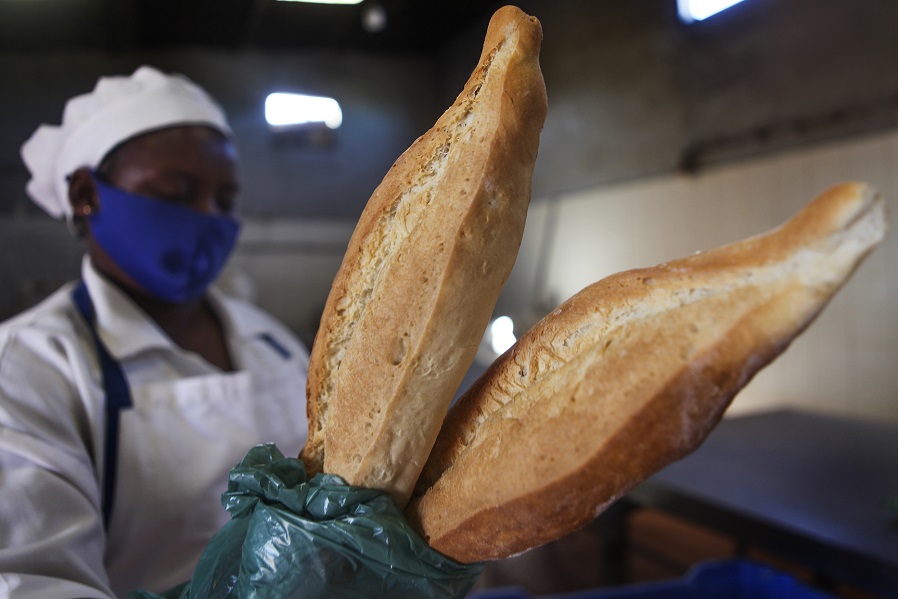Mozambique: Average prices rose slightly in August - AIM report
War in Ukraine plagues the ‘maguévas’ selling bread on the streets of Maputo

Photo: Lusa
With two price hikes already this year, street vendor Inês Sitoe has to spend twice as much time on Maputo’s sidewalks to sell all the bread she carries in the plastic boxes on her head.
She says customers have abandoned her for manioc, “which comes out cheaper” at ‘matabicho’ time – the name given to breakfast.
“There has been no movement since the price went up,” Inês told Lusa.
Ines is a ‘maguéva’, a Changan word that designates someone who buys bread wholesale from bakeries and resells it on the streets, something she’s been doing for 15 years, when each small loaf cost five meticais (€0.07).
At the beginning of the year, before the two adjustments, Inês would have sold all her 350 loaves – a kind of small baguette – by 9:00 a.m., but now it takes her to the middle of the afternoon.
“Customers don’t buy yesterday’s bread,” she says, so she has to stay on the street until 4:00 p.m. to clear her stock. “As long as the bread doesn’t run out, I won’t leave the street.”
Inês once bought loves wholesale for eight meticais (€0.12), but this year it reached 10 meticais (€0.14 euros), forcing her to resell for 12 meticais (€0.17) instead of 10 meticais, as before.
That’s how she maintains her profit margin of two meticais (€0.03) per loaf, but it creates problems in the monthly budget of those who live in one of the poorest countries, where every penny gains enormous importance.
“I’ve had a lot of breakages – there’s no way to manage the household bills this way,” she complains, adding that she’s reduced the amount of loaves she buys from 350 to 200.
Still, it takes “a long time” for the bread to sell out.
Bakeries justify the rise in bread price with the increase in the price of wheat, whose import has become more difficult and expensive due to the war in Ukraine. They, too, are experiencing a reduction in customer numbers.
In fact, according to Celeste Mabjaia, housewife and manager of the Costa Tembe bakery in Maputo for 28 years, a further increase of 200 meticais (€3.00) in the price of a bag of wheat is expected, up from the current 2,260 meticais (€33.00) to 2,460 meticais (€36.00).
“These are difficult times,” Celeste complains, adding that, in some of the five Costa Tembe bakeries scattered across Maputo, the number of bags of wheat used per day has halved because “customers are decreasing”.
“The ‘magúevas’ have also reduced the amount of bread they take,” she says, and even at the counter “people who bought five to six loaves, now buy three or four, and this creates knock-on effects in the business.”
To try to compensate customers, Arnaldo Lucas, manager of a bakery on the outskirts of Maputo, used another strategy – increasing the weight of a loaf from 145 to 160 grams.
“If we don’t increase the weight, customers fall off,” says Arnaldo, who has worked at the FLN bakery since 2010.
Arnaldo foresees a third increase in bread after a likely rise in wheat prices expected on the 15th of this month. “It’s not certain, it’s still under debate”, he cautions.
“I don’t think customers will welcome another hike, because money is tight,” Deolinda Armindo, a worker at the Pão da Terra bakery, says between serving customers.
Customer Fina Boavida says she understands the reason for the price hikes – after all, “everything has gone up in Mozambique, from wheat to fuel”. “Even if it reaches 15 meticais (€0.21) we will still buy bread,” she says – there’s no way of avoiding it.
In addition to cassava and sweet potatoes, Mozambican families also used to replace bread with sautéed rice, but “the price of oil has also been rising”, which makes the situation “suffocating”.
Thinking about prices these days “is a martyrdom that every housewife feels”, Celeste Mabjaia laments.













Leave a Reply
Be the First to Comment!
You must be logged in to post a comment.
You must be logged in to post a comment.